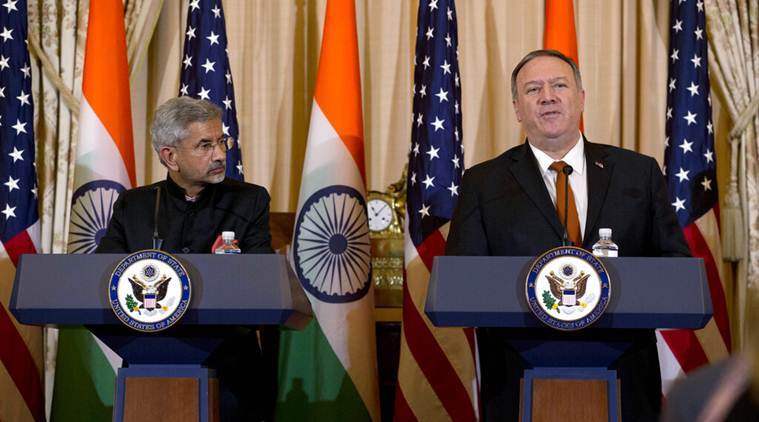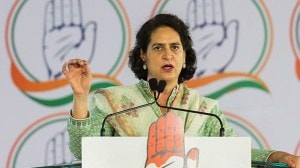- India
- International
US-Iran crisis is pushing India to clarify its stand. But ambiguity may be a more comfortable position
It is very likely that India is now taking the side of the US against Iran, with the blessings of Israel and Saudi Arabia which is becoming an important partner and investor along with the UAE. In this context, Iran may turn to China more actively.
 Though India has been trying to play it from all sides, several defence pacts that it has signed with the US may restrict India from saying “no” to the US should it ask for military assistance in the Middle East.
Though India has been trying to play it from all sides, several defence pacts that it has signed with the US may restrict India from saying “no” to the US should it ask for military assistance in the Middle East.
Last week, the Iraqi Prime Minister asked US Secretary of State Mike Pompeo to send a delegation to discuss ways to pull back approximately 5,200 US troops in the aftermath of the unilateral US airstrikes that the Iraqis said violated Iraq’s sovereignty. A US letter was soon out in the public domain that said the US troops were, in fact, being repositioned in Iraq after Iraq “ordered” the US to do so. US Army personnel soon clarified that the letter was released by mistake, poorly drafted and did not convey the exact position of the US. The US now says that “troop withdrawal” will not even be discussed with Iraq.
For Iraq, this action may invite severe economic sanctions from the US and forceable boycott of trade from another country that may align with the US. The US has warned Iraq that it may lose access to key bank accounts in the US if US troops are forced to leave Iraq. The US also said sanctions may be imposed on Iraq and US troops will not exit Iraq until Iraq pays back the construction costs of the US-built airbases.
Exiting US troops may quash America’s efforts to fight the Islamic State of Iraq and Syria (ISIS). Diminished US presence in Iraq will also weaken its hold in the politics of the Middle East. The US has already identified it as a problem and has resumed training Pakistan’s military after it had stopped in 2018. Despite the resurgence of anti-Americanism that followed the assassination of General Qassim Soleimani in Pakistan, the US may turn more to Pakistan to maintain its presence in the region.
This US-Pakistan rapprochement is not the only bad consequence that this new crisis in the Middle East may have for India. Economic sanctions on Iraq will have a major impact on the Indian economy. Iraq continues to be India’s top crude oil supplier and any US-led economic sanctions will force India to look for alternative oil suppliers, as in the case of Iran in June 2019. This will substantially increase the costs associated with purchase of crude oil for India and the country’s dependence vis-à-vis the UAE, Saudi Arabia and the US, to which New Delhi has already turned, to make up for the anti-Iran sanctions.
After India stopped importing oil from Iran, it started to buy it from the US. India bought about 1,84,000 bpd oil from the US from November 2018 to May 2019, compared with about 40,000 bpd in the same period a year earlier; a surge of nearly a 100 million barrels. India can leverage this increase in oil trade to push for a restriction on its military involvement in the US-Iran conflict. India can also demand a waiver against the sanctions, pointing out that discontinuing trade with Iran could cause a void which will be filled by China and hence create more issues for the US within the region.

Indeed, India’s dependence vis-à-vis the US is more and more obvious in many different domains. Though India has been trying to play it from all sides, several defence pacts that it has signed with the US (to name a few, General Security of Military Information Agreement, Logistics Exchange Memorandum of Agreement, COMCASA, Industrial Security Annex) may restrict India from saying “no” to the US should it ask for military assistance in the Middle East. India has already made an unscheduled deployment of INS Vikramaditya to the North Arabian Sea on-board Light Combat Aircrafts. Though the deployment may be for evacuating Indians in distress in Iran, it may also indicate India’s intent to respond to the US call. The US defence secretary also recently spoke with Indian Defence Minister Rajnath Singh. Though India has not participated in any military operations, other than UN peacekeeping, after the conflict in Sri Lanka in 1987, it has participated in numerous joint exercises with the US around “interoperability” of Indian and American troops.
This new crisis may seal the fate of India-Iran relations. Though Iran has relied on India in times of sanctions, India’s increasing tendency to accommodate American requests has put a dent in India-Iran relations. Iran’s Foreign Minister Mohammad Javad Zarif recently voiced this disillusionment when he said that, “India has certainly taken a stance against the sanctions. so that’s been encouraging, (but) of course, we expected our friends to be more resilient vis-a-vis US pressure”.
The US recently exempted the Chabahar port from sanctions stating that the port has been crucial for India to provide humanitarian aid in Afghanistan. India’s foreign minister also recently visited the Chabahar port and it is likely that funds allocated for its development may be increased. Such exemptions may be US tricks to lure and keep India on its side. Though exempting the Chabahar port from sanctions is a good move, it was not a crucial move that would have changed India’s dynamics in the Middle East — India was anyway putting Chabahar on the back seat, after realising that American sanctions had completely transformed the regional landscape, geopolitically as well as economically (especially in terms of trade).
It is very likely that India is now taking the side of the US against Iran, with the blessings of Israel and Saudi Arabia which is becoming an important partner and investor along with the UAE. In this context, Iran may turn to China more actively. Beijing has already committed over USD400 billion in Iran’s energy-related manufacturing sector over the next 25 years. While India has stopped the purchase of Iranian crude completely since May 2019 when it was announced that Significant Reduction Exception (SRE) would not be extended, China continues to buy an average of 1,61,000 bpd, as of October 2019 from Iran. Albeit this has come down from 8,28,000 bpd in October 2018, China remains Iran’s largest single buyer.
In many ways, the present crisis is an acid test for India’s doctrine of strategic autonomy or multi-alignment — new variants of the non-alignment of yesterday. It clarifies where India stands in international relations, but ambiguity was probably a more comfortable position.
This article first appeared in the print edition of The Indian Express, titled ‘Three’s a crowd’, on January 15, 2020.
Jaffrelot is senior research fellow at CERI-Sciences Po/CNRS, Paris and professor of Indian Politics and Sociology at King’s India Institute and Jumle is an associate at Ikigai Law, New Delhi
EXPRESS OPINION
More Explained
Apr 27: Latest News
- 01
- 02
- 03
- 04
- 05











































